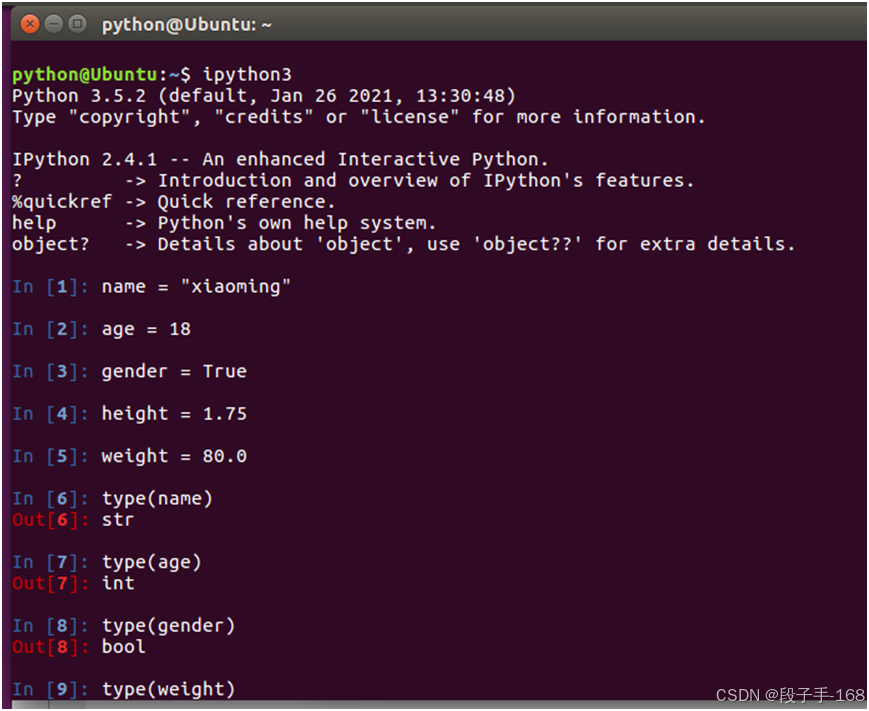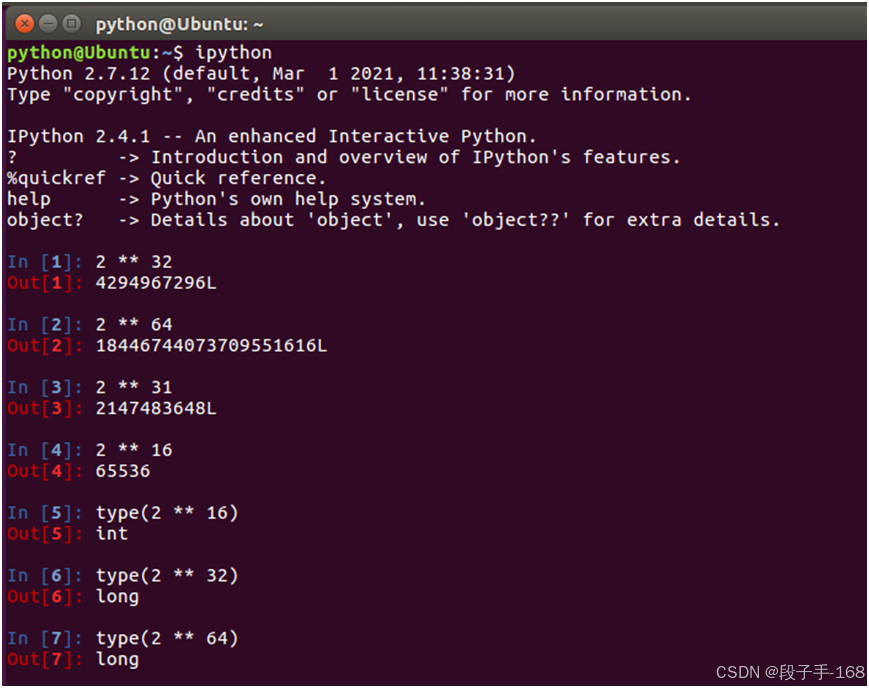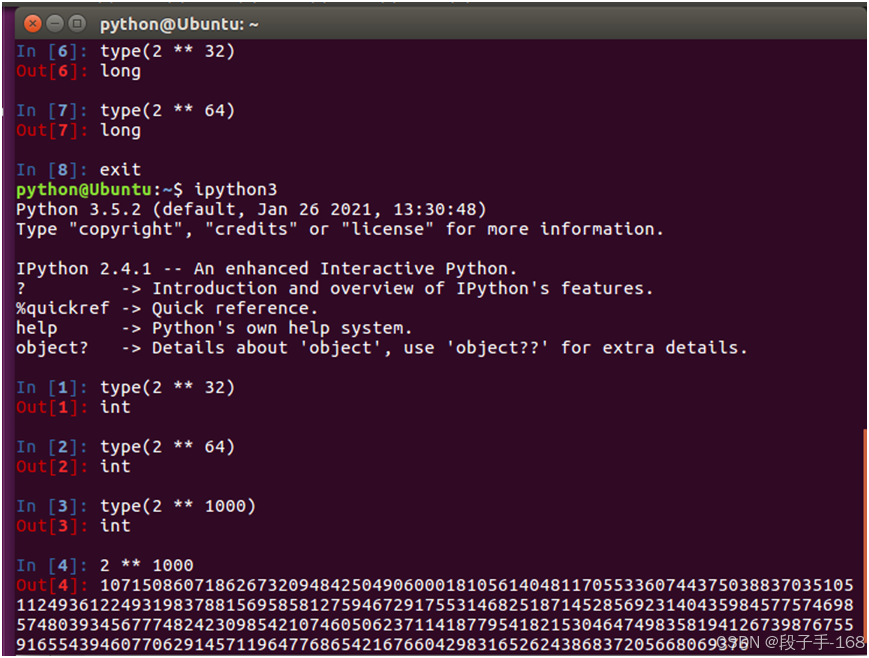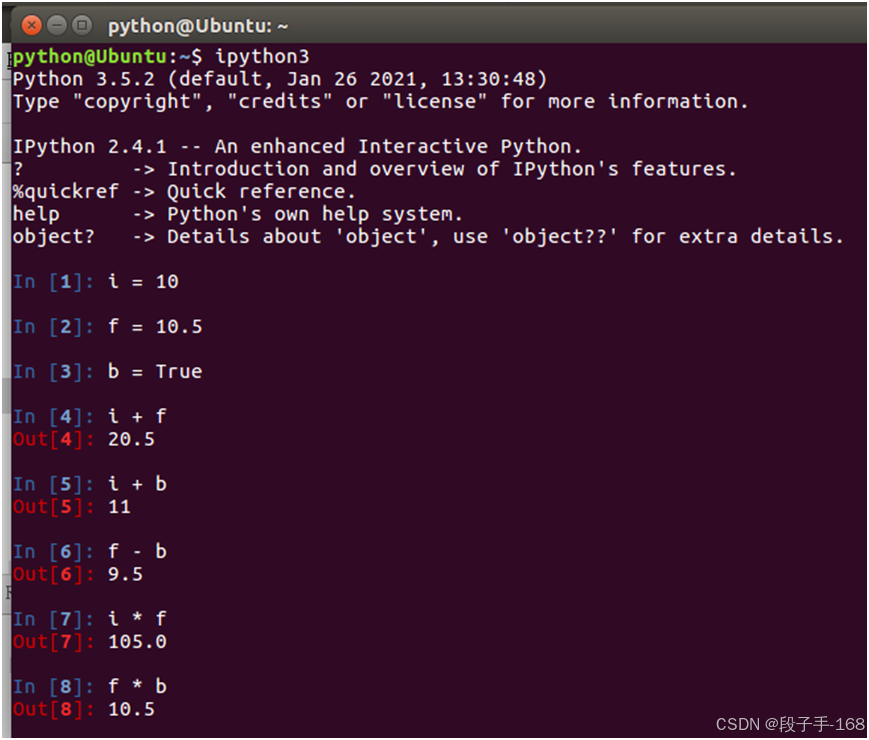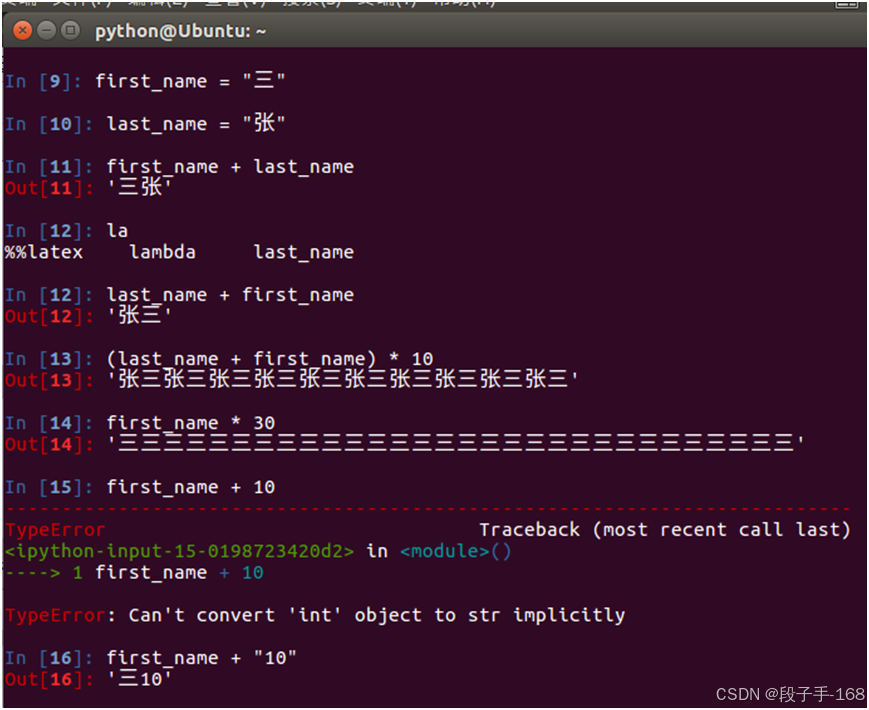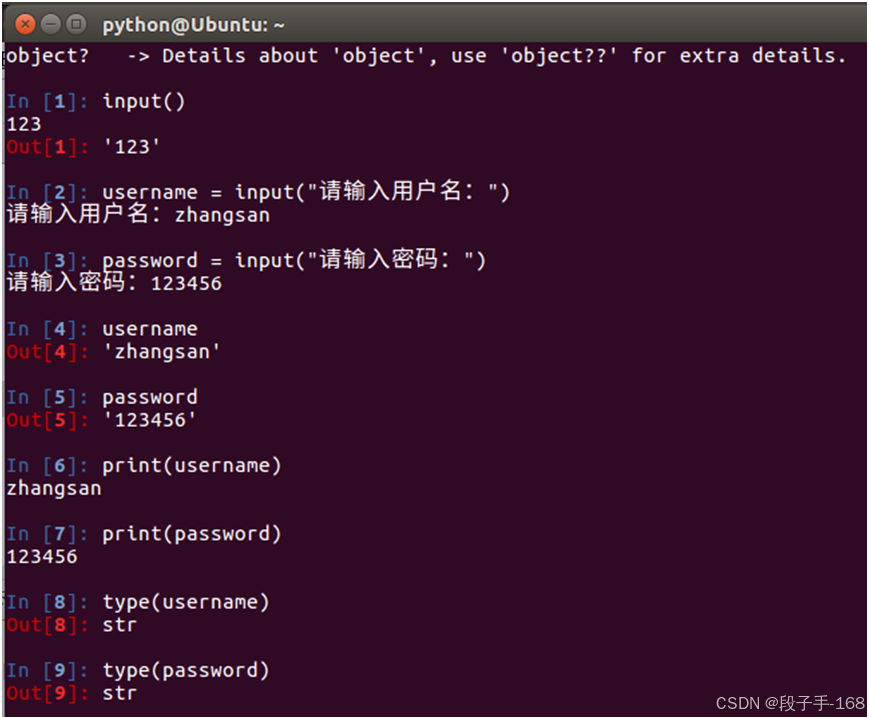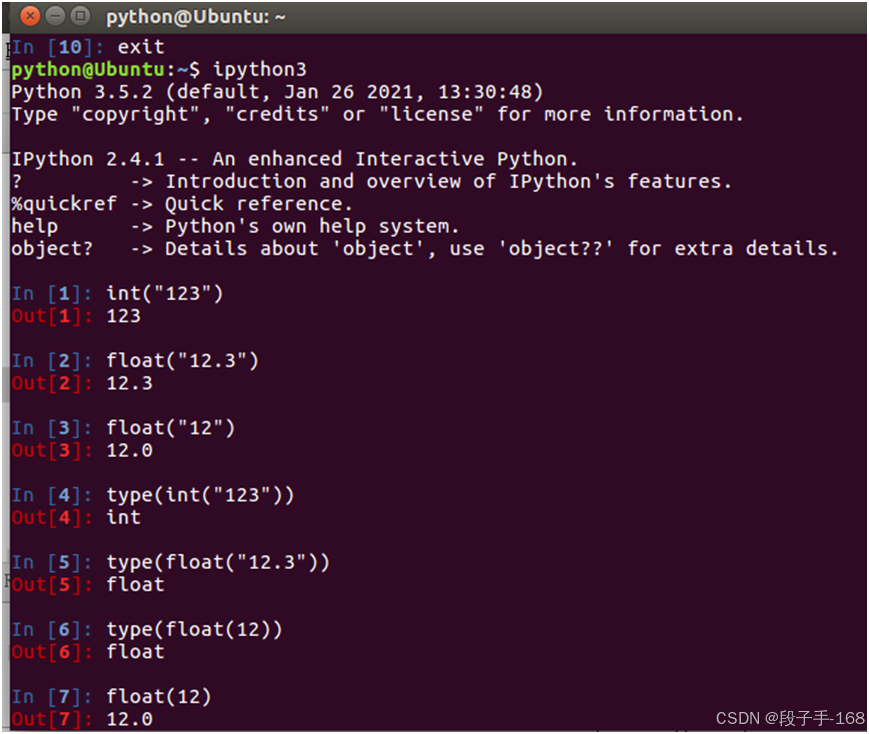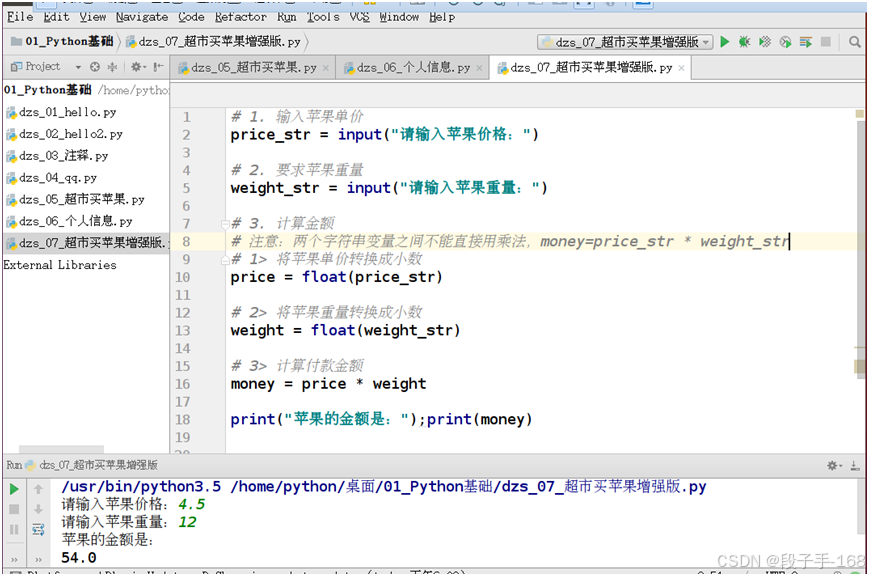07_ Python基础到实战一飞冲天(二)-python基础(七)–变量类型计算与输入输出
一、变量的类型-04-Python中的变量类型
1、python 变量的类型
- 在
Python中定义变量是 不需要指定类型(在其他很多高级语言中都需要)。 - 数据类型可以分为 数字型 和 非数字型。
2、python 变量的类型 : 数字型
* 整型 (`int`)
* 浮点型(`float`)
* 布尔型(`bool`)
* 真 `True` `非 0 数` —— **非零即真**
* 假 `False` `0`
* 复数型 (`complex`)
* 主要用于科学计算,例如:平面场问题、波动问题、电感电容等问题。
3、python 变量的类型 :非数字型
* 字符串
* 列表
* 元组
* 字典
二、变量的类型-05-type函数查看变量类型
1、在 ipython 交互式终端,可以使用 type 函数可以查看一个变量的类型
In [1]: name = "xiaoming"
In [2]: age = 18
In [3]: gender = True
In [4]: height = 1.75
In [5]: weight = 80.0
In [6]: type(name)
Out[6]: str
In [7]: type(age)
Out[7]: int
In [8]: type(gender)
Out[8]: bool
In [9]: type(weight)
Out[9]: float
In [10]: type(height)
Out[10]: float
2、ipython3 查看变量类型 示例:
三、变量的类型-06-Python2.x区分int和long
1、提示:在 Python 2.x 中,整数 根据保存数值的长度还分为:int 和 long
int(整数)long(长整数)
2、在 ipython 和 ipython3 中查看整数类型。
python@Ubuntu:~$ ipython
Python 2.7.12 (default, Mar 1 2021, 11:38:31)
Type "copyright", "credits" or "license" for more information.
IPython 2.4.1 -- An enhanced Interactive Python.
? -> Introduction and overview of IPython's features.
%quickref -> Quick reference.
help -> Python's own help system.
object? -> Details about 'object', use 'object??' for extra details.
In [1]: 2 ** 16
Out[1]: 65536
In [2]: 2 ** 32
Out[2]: 4294967296L
In [3]: 2 ** 64
Out[3]: 18446744073709551616L
In [4]: 2 ** 1000
Out[4]: 10715086071862673209484250490600018105614048117055336074437503883703510511249361224931983788156958581275946729175531468251871452856923140435984577574698574803934567774824230985421074605062371141877954182153046474983581941267398767559165543946077062914571196477686542167660429831652624386837205668069376L
In [5]: type(2**16)
Out[5]: int
In [6]: type(2**32)
Out[6]: long
In [7]: type(2**64)
Out[7]: long
In [8]: type(2**1000)
Out[8]: long
python@Ubuntu:~$ ipython3
Python 3.5.2 (default, Jan 26 2021, 13:30:48)
Type "copyright", "credits" or "license" for more information.
IPython 2.4.1 -- An enhanced Interactive Python.
? -> Introduction and overview of IPython's features.
%quickref -> Quick reference.
help -> Python's own help system.
object? -> Details about 'object', use 'object??' for extra details.
In [1]: 2 ** 16
Out[1]: 65536
In [2]: 2 ** 32
Out[2]: 4294967296
In [3]: 2 ** 64
Out[3]: 18446744073709551616
In [4]: type(2 ** 16)
Out[4]: int
In [5]: type(2 ** 32)
Out[5]: int
In [6]: type(2 ** 64)
Out[6]: int
In [7]: type(2 ** 1000)
Out[7]: int
In [8]: 2 ** 1000
Out[8]: 10715086071862673209484250490600018105614048117055336074437503883703510511249361224931983788156958581275946729175531468251871452856923140435984577574698574803934567774824230985421074605062371141877954182153046474983581941267398767559165543946077062914571196477686542167660429831652624386837205668069376
In [9]:
四、变量间的计算-01-数字型变量可以直接计算
1、 不同类型变量之间的计算: 数字型变量 之间可以直接计算
1) 在 Python 中,两个数字型变量是可以直接进行 算数运算的。
2) 如果变量是 bool 型,在计算时
* `True` 对应的数字是 `1`
* `False` 对应的数字是 `0`
2、数字型变量计算演练步骤
1)定义整数 i = 10
2)定义浮点数 f = 10.5
3)定义布尔型 b = True
4)在 iPython 中,使用上述三个变量相互进行算术运算。
3、数字型变量计算在 ipython3中演练示例
In [1]: i = 10
In [2]: f = 10.5
In [3]: b = True
In [4]: i + f
Out[4]: 20.5
In [5]: i+b
Out[5]: 11
In [6]: f-b
Out[6]: 9.5
In [7]: i*f
Out[7]: 105.0
In [8]: f*b
Out[8]: 10.5
五、变量间的计算-02-拼接字符串的两种方式
1、 字符串变量 之间使用 + 拼接字符串
- 在 Python 中,字符串之间可以使用
+拼接生成新的字符串
In [1]: first_name = "三"
In [2]: last_name = "张"
In [3]: first_name + last_name
Out[3]: '三张'
In [12]: last_name + first_name
Out[12]: '张三'
In [13]: (last_name + first_name) * 10
Out[13]: '张三张三张三张三张三张三张三张三张三张三'
In [14]: first_name * 30
Out[14]: '三三三三三三三三三三三三三三三三三三三三三三三三三三三三三三'
In [15]: first_name + 10
---------------------------------------------------------------------------
TypeError Traceback (most recent call last)
<ipython-input-15-0198723420d2> in <module>()
----> 1 first_name + 10
TypeError: Can't convert 'int' object to str implicitly
In [16]: first_name + "10"
Out[16]: '三10'
2、 字符串变量 可以和 整数 使用 * 重复拼接相同的字符串
In [1]: "-" * 50
Out[1]: '--------------------------------------------------'
3、 数字型变量 和 字符串 之间 不能进行其他计算
In [1]: first_name = "zhang"
In [2]: x = 10
In [3]: x + first_name
---------------------------------------------------------------------------
TypeError: unsupported operand type(s) for +: 'int' and 'str'
类型错误:`+` 不支持的操作类型:`int` 和 `str`
4、示例
六、变量的输入输出-01-输入和函数的概念
1、 变量的输入
1)所谓 输入,就是 用代码 获取 用户通过 键盘 输入的信息。
- 例如:去银行取钱,在 ATM 上输入密码。
2)在 Python 中,如果要获取用户在 键盘 上的输入信息,需要使用到 input 函数。
2、关于函数
1)一个 提前准备好的功能(别人或者自己写的代码),可以直接使用,而 不用关心内部的细节。
2)例如python中的如下函数
print(x) : 将 x 输出到控制台。
type(x) : 查看 x 的变量类型。
七、变量的输入输出-02-input函数的基本使用
1、input 函数实现键盘输入
1)在 Python 中可以使用 input 函数从键盘等待用户的输入。
2)用户输入的 任何内容 Python 都认为是一个 字符串。
3)input() 函数 语法如下:
字符串变量 = input("提示信息:")
2、input 函数实现键盘输入 示例:
In [1]: input()
123
Out[1]: '123'
In [2]: username = input("请输入用户名:")
请输入用户名:zhangsan
In [3]: password = input("请输入密码:")
请输入密码:123456
In [4]: username
Out[4]: 'zhangsan'
In [5]: password
Out[5]: '123456'
In [6]: print(username)
zhangsan
In [7]: print(password)
123456
In [8]: type(username)
Out[8]: str
In [9]: type(password)
Out[9]: str
八、变量的输入输出-03-类型转换函数介绍
1、类型转换函数
int(x) : 将 x 转换为一个整数 。
float(x) : 将 x 转换到一个浮点数。
2、类型转换 示例:
python@Ubuntu:~$ ipython3
Python 3.5.2 (default, Jan 26 2021, 13:30:48)
Type "copyright", "credits" or "license" for more information.
IPython 2.4.1 -- An enhanced Interactive Python.
? -> Introduction and overview of IPython's features.
%quickref -> Quick reference.
help -> Python's own help system.
object? -> Details about 'object', use 'object??' for extra details.
In [1]: int("123")
Out[1]: 123
In [2]: float("12.3")
Out[2]: 12.3
In [3]: float("12")
Out[3]: 12.0
In [4]: type(int("123"))
Out[4]: int
In [5]: type(float("12.3"))
Out[5]: float
In [6]: type(float(12))
Out[6]: float
In [7]: float(12)
Out[7]: 12.0
In [8]:
九、变量的输入输出-04-买苹果增强版演练
1、变量输入演练 —— 超市买苹果增强版
需求
- 收银员输入 苹果的价格,单位:元/斤。
- 收银员输入 用户购买苹果的重量,单位:斤。
- 计算并且 输出 付款金额。
2、超市买苹果增强版 演练方式 1
1)创建 dzs_07_超市买苹果增强版.py 文件
2)代码:
# 1. 输入苹果单价
price_str = input("请输入苹果价格:")
# 2. 要求苹果重量
weight_str = input("请输入苹果重量:")
# 3. 计算金额
# 注意:两个字符串变量之间不能直接用乘法,money=price_str * weight_str
# 1> 将苹果单价转换成小数
price = float(price_str)
# 2> 将苹果重量转换成小数
weight = float(weight_str)
# 3> 计算付款金额
money = price * weight
print("苹果的金额是:");print(money)
十、变量的输入输出-05-提出问题—从控制台输入数字需要两个变量处理
1、提问思考1:超市买苹果增强版演练中,针对 价格 定义了几个变量?
* **两个**
* `price_str` 记录用户输入的价格字符串。
* `price` 记录转换后的价格数值。
2、提问思考2:超市买苹果增强版演练中,如果开发中,需要用户通过控制台 输入 很多个 数字,针对每一个数字都要定义两个变量,方便吗?
price = float(input("请输入价格:"))
上一节关联链接请点击:
